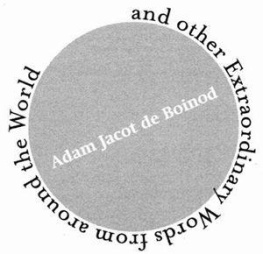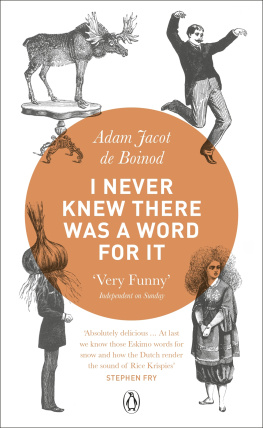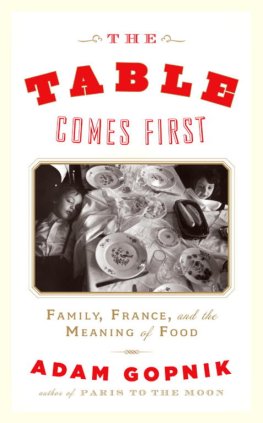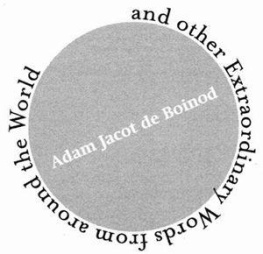PENGUIN REFERENCE
The Meaning of Tingo
A luscious list of linguistic one-liners that no self-respecting toilet in the land should be without Daily Express
Extraordinary Sunday Times , Books of the Year
A collection / dictionary / glossary (that its indefinable is one of its many strengths) of words from around the world which have bizarrely exact meanings both educational and entertaining, and very funny as well Independent on Sunday
I love The Meaning of Tingo Benjamin Zephaniah
A pleasure to dip into Sunday Telegraph
An addictive book of quirky words and phrases from around the world Time Out
The must-have British stocking filler this book is a gem Economist
I love this book absolutely marvellous stuff Oldie
ABOUT THE AUTHOR
Adam Jacot de Boinods interest in foreign languages was first aroused when doing research for the BBC programme QI and subsequently developed into a full-on vokabulyu (Russian passion for foreign words). While searching through 280 dictionaries, 140 websites and numerous books on language, he developed an undoubted samlermani (Danish mania for collecting), became close to being fisselig (German flustered to the point of incompetence) and narrowly avoided karoshi (Japanese death from overwork). He is now intending to nglayap (Indonesian wander far from home with no particular purpose).
The Meaning of Tingo


PENGUIN BOOKS
PENGUIN BOOKS
Published by the Penguin Group
Penguin Books Ltd, 80 Strand, London WC2R 0RL , England
Penguin Group (USA) Inc., 375 Hudson Street, New York, New York 10014, USA
Penguin Group (Canada), 90 Eglinton Avenue East, Suite 700, Toronto,
Ontario, Canada M4P 2Y3 (a division of Pearson Penguin Canada Inc.)
Penguin Ireland, 25 St Stephens Green, Dublin 2, Ireland (a division of Penguin Books Ltd)
Penguin Group (Australia), 250 Camberwell Road, Camberwell, Victoria 3124, Australia
(a division of Pearson Australia Group Pty Ltd)
Penguin Books India Pvt Ltd, 11 Community Centre, Panchsheel Park,
New Delhi 110 017, India
Penguin Group (NZ), cnr Airborne and Rosedale Roads, Albany,
Auckland 1310, New Zealand (a division of Pearson New Zealand Ltd)
Penguin Books (South Africa) (Pty) Ltd, 24 Sturdee Avenue,
Rosebank, Johannesburg 2196, South Africa
Penguin Books Ltd, Registered Offices: 80 Strand, London wc2R ORL , England
www.penguin.com
First published 2005
Published in paperback 2006
Copyright Adam Jacot de Boinod, 2005
Illustrations copyright Sandra Howgate, 2005
All rights reserved
The moral right of the authors has been asserted
Except in the United States of America, this book is sold subject to the condition that it shall not, by way of trade or otherwise, be lent, re-sold, hired out, or otherwise circulated without the publishers prior consent in any form of binding or cover other than that in which it is published and without a similar condition including this condition being imposed on the subsequent purchaser
ISBN: 978-0-14-195457-8
My interest in the quirkiness of foreign words was triggered when one day, working as a researcher for the BBC quiz programme QI , I picked up a weighty Albanian dictionary to discover that they have no fewer than twenty-seven words for eyebrows and the same number for moustache, ranging from mustaqe madh , or bushy, to a mustaqe posht , one which droops down at both ends.
My curiosity rapidly grew into a passion. I was soon unable to go

near a second-hand bookshop or library without seeking out the shelves where the foreign language dictionaries were kept. I would scour books in friends houses with a similar need to pan for gold. My collection of wonderful words with no equivalent in the English language grew even longer, and I started to make a shortlist of my favourites: nakhur , for example, is a Persian word (which may not even be known to most native speakers) meaning a camel that wont give milk until her nostrils have been tickled; and areodjarekput , the Inuit for to exchange wives for a few days only. Many described strange or unbelievable things. When and why, for example, would a man be described as a marilopotes , Ancient Greek for a gulper of coaldust? And could the Japanese samurai really have used the verb tsuji-giri , meaning to try out a new sword on a passer-by?
Others expressed concepts that seemed all too familiar. We have all met a Zechpreller , the German description of someone who leaves without paying the bill; spent too much time with an ataoso , Central American Spanish for one who sees problems with everything; or worked with a neko-neko , Indonesian for one who has a creative idea which only makes things worse.
My passion became a quiet obsession. I combed through over two million words in hundreds of dictionaries. I trawled the Internet, phoned Embassies, and tracked down foreign language speakers who could confirm my findings. I discovered that not everything sounds the same the world over: in Afrikaans, frogs go kwaak-kwaak , in Mexico cats go tlatzomia , while in Germany the noise of Rice Crispies snap, crackle and popping is Knisper! Knasper! Knusper!
I found beautiful words to describe things for which we have no concise expression in English, like serein , the French for the rain that falls from a cloudless sky; or wamadat , Persian for the intense heat of a sultry night. I found words for all stages of life, from paggiq , Inuit for the flesh torn when a woman delivers a baby, through Torschlusspanik , German for the fear of diminishing opportunities as one gets older, to mingmu , Chinese for to die without regret. I savoured the direct logic of Danish, the succinctness of Malay, the sheer wackiness of Japanese, and realized that sometimes a dictionary can tell you more about a culture than a guidebook.
I looked at languages from all corners of the world, from the Fuegian of southernmost Chile to the Inuit of northernmost Alaska, and from the Maori of the remote Cook Islands to Siberian Yakut. Some of them describe, of course, strictly local concepts and sensations, such as the Hawaiian kapauu , to drive fish into the waiting net by striking the water with a leafy branch; or pukajaw , Inuit for firm snow that is easy to cut and provides a warm shelter. But others reinforce the commonality of human experience. Havent we all felt termangu-mangu , Indonesian for sad and not sure what to do or mukamuka , Japanese for so angry one feels like throwing up? Most reassuring is to find the thoughts that lie on the tip of an English tongue, here crystallized into vocabulary: from the Zambian language of Bemba sekaseka , to laugh without reason, through the Czech nedovtipa , one who finds it difficult to take a hint, to the Japanese bakku-shan , a woman who appears pretty when seen from behind but not from the front.
Next page














